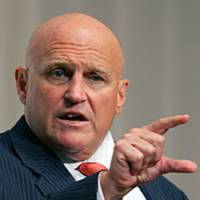U.S.-Japan relations will remain the pillar of president-elect Barack Obama's foreign policy in Asia, but Tokyo must play its part if it hopes to remain in the "driver's seat," former U.S. Deputy Secretary of State Richard Armitage said Friday in Tokyo.
Speaking during a symposium at Keio University, Armitage, an expert on Asian issues who advised President George W. Bush until 2005, said Japan must show what it can do as a major player in the global community.
Japanese delegates often tell U.S. presidents that Article 9 of Japan's Constitution limits its international contribution, but it should refrain from dodging issues and instead "figure out beforehand what you can do to alleviate suffering in Africa and what you can do to alleviate the problems the coalition is having in Afghanistan."
"That kind of approach, rather than a negative one, will be very welcome for the United States," he said.
The key uncertainty today is whether Japan and Europe can overcome social and demographic problems and take part in meaningful global issues, Armitage continued, adding that if that does not happen, Japan will be pushed to "the back of the bus."
However, Armitage assured that the Clinton-era friction of the 1990s is unlikely to arise in the Obama administration, because young Democrats joining the foreign policy team share his view that Japan is a key player in U.S. diplomacy.
The expert had warned in a 2000 report that the U.S. and Japan had drifted apart during Bill Clinton's Democratic administration. But he said Friday that such fears under Sen. Obama are "unfounded."

















With your current subscription plan you can comment on stories. However, before writing your first comment, please create a display name in the Profile section of your subscriber account page.